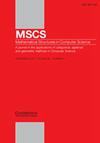Discrete equational theories
IF 0.9
4区 计算机科学
Q4 COMPUTER SCIENCE, THEORY & METHODS
引用次数: 0
Abstract
On a locally  $\lambda$-presentable symmetric monoidal closed category
$\lambda$-presentable symmetric monoidal closed category  $\mathcal {V}$,
$\mathcal {V}$,  $\lambda$-ary enriched equational theories correspond to enriched monads preserving
$\lambda$-ary enriched equational theories correspond to enriched monads preserving  $\lambda$-filtered colimits. We introduce discrete
$\lambda$-filtered colimits. We introduce discrete  $\lambda$-ary enriched equational theories where operations are induced by those having discrete arities (equations are not required to have discrete arities) and show that they correspond to enriched monads preserving preserving
$\lambda$-ary enriched equational theories where operations are induced by those having discrete arities (equations are not required to have discrete arities) and show that they correspond to enriched monads preserving preserving  $\lambda$-filtered colimits and surjections. Using it, we prove enriched Birkhof-type theorems for categories of algebras of discrete theories. This extends known results from metric spaces and posets to general symmetric monoidal closed categories.
$\lambda$-filtered colimits and surjections. Using it, we prove enriched Birkhof-type theorems for categories of algebras of discrete theories. This extends known results from metric spaces and posets to general symmetric monoidal closed categories.
离散等式理论
在一个局部$\lambda$可呈现的对称一元封闭范畴$\mathcal {V}$上,$\lambda$-ary丰富等式理论对应于保留$\lambda$过滤的列子的丰富单子。我们引入了离散的$\lambda$-ary丰富等式理论,其中运算是由那些具有离散算术数的运算诱导的(等式不要求具有离散算术数),并证明它们对应于保留$\lambda$-iltered colimits和投射的丰富单子。利用它,我们证明了离散理论代数范畴的丰富伯克霍夫型定理。这将已知的度量空间和集合的结果扩展到了一般对称一元封闭范畴。
本文章由计算机程序翻译,如有差异,请以英文原文为准。
求助全文
约1分钟内获得全文
求助全文
来源期刊

Mathematical Structures in Computer Science
工程技术-计算机:理论方法
CiteScore
1.50
自引率
0.00%
发文量
30
审稿时长
12 months
期刊介绍:
Mathematical Structures in Computer Science is a journal of theoretical computer science which focuses on the application of ideas from the structural side of mathematics and mathematical logic to computer science. The journal aims to bridge the gap between theoretical contributions and software design, publishing original papers of a high standard and broad surveys with original perspectives in all areas of computing, provided that ideas or results from logic, algebra, geometry, category theory or other areas of logic and mathematics form a basis for the work. The journal welcomes applications to computing based on the use of specific mathematical structures (e.g. topological and order-theoretic structures) as well as on proof-theoretic notions or results.
 求助内容:
求助内容: 应助结果提醒方式:
应助结果提醒方式:


